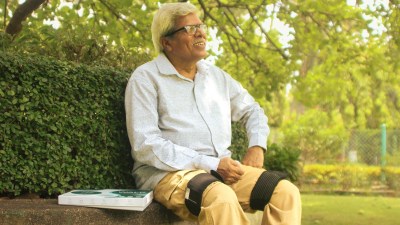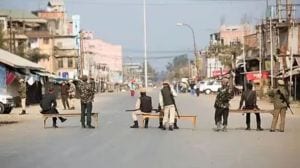Four funerals and a warning
With the first cruise missiles lighting up Baghdad8217;s skies before the sun could do so, human civilisation has taken a giant leap backwa...

With the first cruise missiles lighting up Baghdad8217;s skies before the sun could do so, human civilisation has taken a giant leap backwards. The 21st century, before it has had the time to define itself, is already witnessing the unravelling of one of the most significant cultural gains of the 20th, achieved after much bloodshed: The ban on the threat or use of force against the territorial integrity or political independence of any state, unless authorised by the Security Council or in self-defence. Symbolising this is a bronze sculpture just outside the UN building in New York 8212; that of a gun with its barrel tied into a knot. That knot has just been undone.
There is also a commemorative slab that faces the UN, bearing words promising that humanity will beat its swords into ploughshares and its spears into pruning hooks. Today, ploughshares are being fashioned into tanks, pruning hooks into deadly missiles.
Honourable words like 8220;just8221; 8220;good faith8221; 8220;peace8221;, 8220;liberation8221;, 8220;sacrifice8221; and 8220;liberty8221; have been hijacked by a rogue elephant among nations to justify the unjustifiable, consecrate the unconscionable, glorify the condemnable.
Therefore, at this moment of extreme sadness as the Iraqis, having lived under the shadow of the tyrant could now die under the shadow of the aggressor, let us also count our losses. There are four casualties already.
One, the death of the promise of a war-free world, one in which nations 8212; both powerful and not-so-powerful 8212; had evolved moral principles and legal instruments to co-exist in a complex, conflict-ridden and tense environment.
Two, the death of the idea of national sovereignty. Of course, tyrants need to be overthrown, but they need to be overthrown by their own people. Of course, Saddam Hussein8217;s regime is an obscenity, but it is for his own people to come to that judgement.
In any case, who is to define a tyrant? George W. Bush should know the a danger of defining the term too subjectively 8212; there are many who would use it to characterise him. And for good reason.
Three, the death of international consensus and the idea of multilateral action. Through its politics of smash and grab, the world8217;s only superpower has demonstrated its contempt for the opinion of the overwhelming majority of nations, buttressed by a defence budget of some 360 billion, several times that of the rest of the world put together.
Four, the death of the idea that it is people who make opinion, rather than the napoleonic notion that opinion is any idea that has the weight of force behind it. The US today is guilty not just of disregarding the views of other nations at the high table of the Security Council but that of countless people around the world. This serious disconnect between what people say and what governments do, bodes ill for democracy in the future.
Bush is not known to have read many books. But he must surely know of a favourite American hero by the name of Benjamin Franklin. Yessir, the very same who once wrote that there never was a good war or a bad peace. Next time he talks about a 8220;just war8221; he may with good purpose recall those words.
- 01
- 02
- 03
- 04
- 05






























